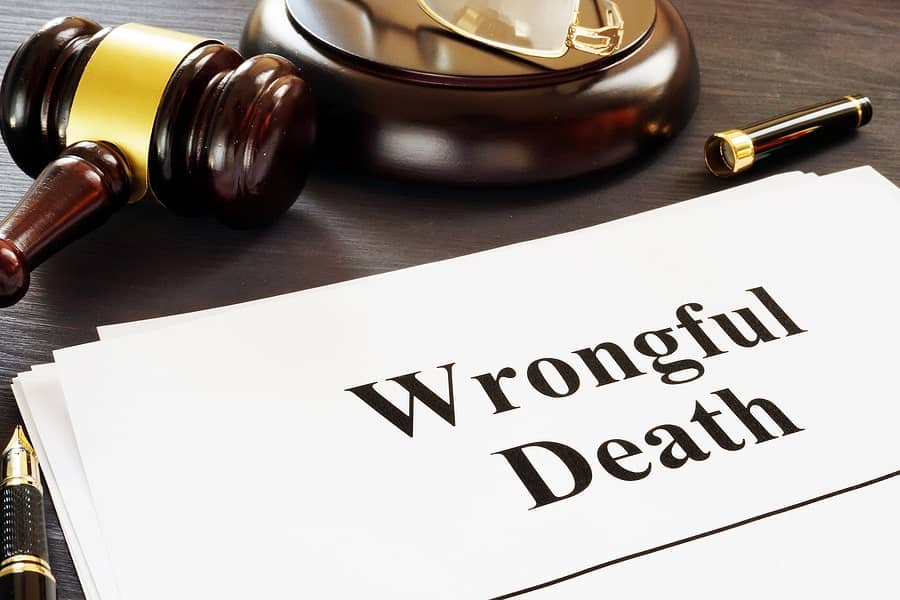A wrongful death happens when someone dies because of someone else’s wrongful conduct. Wrongful deaths are typically accidental and avoidable, but they can also be the result of an intentional act. Families are left picking up the pieces. In the tough times following the loss of a loved one, grieving families can trust a wrongful death attorney to help file a claim.
Wrongful death claims are grueling, but having an attorney working for you can relieve the pressure to comply with procedural rules and strict deadlines. An attorney will aid in securing the compensation necessary to support you and your family. You can rely on your legal team to take care of the legal side of recovery while you tend to your family's needs.
If your family lost a loved one in an accident, contact a San Jose wrongful death attorney today.
What Is a Wrongful Death Claim?
A wrongful death lawsuit is a civil action against the person or entity responsible for causing the victim's death. Plaintiffs in a wrongful death lawsuit are usually closely related to the deceased. Surviving family members can receive compensation for their financial and emotional losses if successful. Laws regarding how plaintiffs recover compensation for a wrongful death claim vary depending on the state.
What Are the Elements of a Wrongful Death Claim?

The specific elements of a wrongful death claim vary from state to state, but they typically involve the common law elements of negligence or an intentional act. For a wrongful death claim based on negligence, the typical elements that the plaintiffs need to prove include the following:
- The person or entity responsible for the death owed the victim a duty of care.
- The responsible party breached their duty of care.
- The responsible party's breach caused the accident and injuries that led to the victim's death.
- The deceased's death causes their heirs losses.
On the other hand, in a wrongful death claim based on an intentional act, you must typically prove some variation of the following elements:
- The other party had the intent to commit an act
- The person made a non-consensual physical contact with the victim
- The contact caused the fatal injury or injuries
How Long Do I Have to Sue for Wrongful Death?
Family members seeking to file a wrongful death claim do not have an unlimited amount of time to do so. Each plaintiff must consider the applicable statute of limitations before filing a civil lawsuit because these deadlines are strict and subject to few exceptions. Importantly, the statute of limitations for wrongful death claims varies from state to state, so you should always discuss your options with a lawyer near you as soon as possible.
For example, the law in California gives wrongful death plaintiffs two years from the death of their loved one to file a wrongful death lawsuit. Two exceptions extend the statute of limitations. These exceptions stop the statute of limitations and allow victims more time to sue for damages, depending on their situation.
The law allows plaintiffs more time to sue for wrongful death if the cause of death is not immediately apparent when the victim dies. For example, if the deceased lost their life in a multi-car accident and suffered various injuries, it can take time to understand what caused their death. Under the discovery rule, the family has two years to file a lawsuit from when they discovered the cause of death.
A child has two years from their eighteenth birthday to file a lawsuit if their parents die in a wrongful death accident.
Who Can Sue for Wrongful Death?
Wrongful death claims are unique because state law only allows specific plaintiffs to file them. Typically, the individuals allowed to bring a claim are close family members or others who were financially dependent on the decedent.
For instance, in California, the following parties may file a wrongful death claim:
- The victim's surviving spouse or domestic partner
- The deceased's children
- The deceased's grandchildren only if the victim's children are also dead
- Minors, like stepchildren, who received at least 50 percent of financial support from the deceased
How Can I File a Wrongful Death Claim?
Filing a wrongful death lawsuit happens in stages. An experienced attorney can help at every stage of the lawsuit.
First, you must identify who is responsible for causing the accident. Wrongful deaths often happen because of negligent acts. There are many potentially responsible parties. For example, truck drivers, motorcyclists, or corporations that place defective products in stores can share responsibility. Remember to name each potential defendant in a claim. An experienced attorney will investigate the case and help hold each responsible person accountable.
Next, your attorney will file a complaint in civil court. A complaint is the start of a civil lawsuit. The complaint should include the identity of the defendants and a simple statement of the facts. The plaintiff must ensure that the defendant receives a copy of the complaint. Delivering the complaint to the defendant is called service of process. The defendant has thirty days to respond.
While your case is pending, you can expect a fact-finding stage of the lawsuit called discovery. During discovery, each party can request information from the other side that might help prove their case. Your attorney will aid in leveraging the discovery phase.
Many civil lawsuits get resolved through settlement negotiations. Your attorney will work with the insurance company toward a satisfactory settlement. Your case moves on to trial if each side does not agree to a settlement. A wrongful death trial can feel emotionally exhausting. An experienced attorney will help ease your burden so you can focus on your family.
What Damages are Available in a Wrongful Death Case?

Many families face great emotional and financial difficulties after losing a loved one. A wrongful death settlement may include compensation for the value of the household services the victim performed, burial and funeral expenses, and financial support for their family. A wrongful death attorney can assist in identifying damages and pursuing compensation. A settlement might include a combination of economic and non-economic damages, explained further below.
Importantly, the specific damages available in wrongful death claims vary from state to state. They typically involve losses related to financial and emotional support. In addition, many states allow the estate of the deceased to obtain compensation for certain losses.
Economic Damages
State law allows the plaintiffs in a wrongful death case to pursue economic damages. Economic damages typically include:
- Funeral and burial expenses.
- The loss of any anticipated inheritance.
- The reasonable cost of hiring domestic help to replace the victim's support.
- Monetary support to replace the victim's financial contributions to the family.
Non-economic Damages
Awarding non-economic damages to wrongful death plaintiffs is intended to replace unquantifiable losses. Each state differs regarding what wrongful death plaintiffs may recover as non-economic damages. Under state law, plaintiffs may typically recover compensation for non-economic losses like:
- Loss of companionship
- Loss of protection, training, guidance, or moral support
- Loss of sexual relations
- Loss of social standing
Punitive Damages
Punitive damages in wrongful death suits are available in some jurisdictions but are relatively rare. These damages aim to punish the defendant for their egregious misconduct or recklessness rather than compensating the victim's family. Courts carefully assess the circumstances and evidence before awarding punitive damages, making them an exception rather than the norm in such cases.
Is a Survival Action Different from a Wrongful Death Claim?
Your state may allow family members or other authorized parties to file survival actions in addition to wrongful death claims. In order to learn about your state’s law on survival actions, call a wrongful death lawyer near you today.
Wrongful Death Claims
A wrongful death claim is initiated by surviving family members to seek compensation for the losses they've suffered as a result of their loved one's death. These losses typically include financial burdens like medical and funeral expenses, lost income, and emotional suffering. Wrongful death claims are intended to provide support to the grieving family.
Survival Actions
Survival actions, in contrast, focus on the rights of the deceased rather than the surviving family. They allow the deceased person's estate, represented by an executor or personal representative, to pursue a claim that the deceased would have had if they had survived. Damages in a survival action cover the pain and suffering experienced by the deceased, medical expenses, and lost wages during their lifetime.
What To Expect From the Insurance Company During a Wrongful Death Case?
Insurance companies want to save money and settle claims for as little as possible. No matter the type of case, it is hard to fight an insurance company. Many insurance companies employ underhanded tactics to avoid payment. You might be unaware of these tricks and how to avoid them. A wrongful death attorney will protect you and your right to recover compensation.

You can expect the insurance company to resist paying you. One way that insurance adjusters protect the company's bottom line is through quick settlement offers. Having an attorney act as an intermediary can help relieve any pressure you might feel after getting an initial settlement offer.
Insurance companies also try to blur the lines of liability. You can expect some blame-shifting during negotiations with the insurance company. This tactic might involve an adjuster assigning fault to your loved one. After a thorough investigation, your attorney will strategize the best response to the insurance company's attempt to blur the lines of liability.
Insurance companies also try to get a statement from the victims immediately after the accident. Speaking to an attorney before making a statement to the insurance company protects your rights. Getting legal advice can lower your chances of painting yourself into a corner with the insurance company.
How Can a Wrongful Death Lawyer Help Me?
A wrongful death case is one of the most challenging lawsuits. The grief that plaintiffs feel after losing a loved one is overwhelming. The additional stress of fighting a legal battle can be too much. A qualified wrongful death attorney taking the lead on your case will allow you to focus on healing.
The facts surrounding wrongful death cases are often complicated. Attorneys help the families of the deceased investigate the accident and discover what caused it. You can avoid potential blame-shifting and attempts to avoid responsibility from potential plaintiffs. A law firm likely has more resources than you do. For example, if your loved one died in a car accident, your attorney might know an accident reconstructionist who can provide clarity about the cause of the accident.
Your attorney will represent you at each stage of the case, including negotiating with the insurance company. They will negotiate on your behalf and represent you at trial. Settlement negotiations are tough. Insurance adjusters work hard to keep costs low for the company, even if that means victims do not receive payment. Attorneys help stand up to insurance companies on behalf of their clients. If your lawyer cannot reach a fair settlement, they will likely take your case to court.
Wrongful death law is complex, and victims often do not know what recovery is available. An experienced attorney will evaluate your case to determine fair compensation for your claim. Your attorney will review your case and identify relevant facts that might increase its value.
Along with investigating your case and representing you at negotiations, your attorney will advise you through every other stage of the case. Wrongful death plaintiffs can rely on legal counsel to explain the implications of each stage of the case. For instance, if the insurance company offers a settlement, your attorney can review its terms and determine if it is sufficient. Knowing the best next step to take during a lawsuit is hard. Your attorney will lead you to the best choice for your situation.
Contact a Wrongful Death Lawyer Today
If you have lost a loved one because of someone else’s wrongful act, your family needs support during this trying time. The grief that you feel can make it significantly harder to pursue a wrongful death claim alone. Fortunately, you don't have to handle the legal side of your loss alone. Give your family the peace of mind and guidance they deserve after experiencing such a significant loss. Contact a compassionate and experienced wrongful death lawyer as soon as you can.
